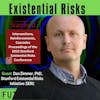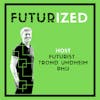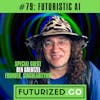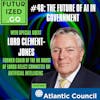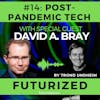The Future of Grid Energy Innovation

Jon Wellinghoff, CEO of GridPolicy and former Chairman of the Federal Energy Regulatory Commission (FERC), interviewed by futurist Trond Arne Undheim.
Now a quick word from our partners: Cleantech.org is a leading virtual research institute and incubato...
Jon Wellinghoff, CEO of GridPolicy and former Chairman of the Federal Energy Regulatory Commission (FERC), interviewed by futurist Trond Arne Undheim.
Now a quick word from our partners: Cleantech.org is a leading virtual research institute and incubator to the cleantech sector, with an online membership base of over 45,000. Subscribe to the site to learn more about cleantech and meet scientists and entrepreneurs to commercialize your ideas. Contact info AT cleantech.org. That’s cleantech.org/
In this conversation, they talk about The transdisciplinary mindset needed to understand energy innovation, The policy/regulation impasse. The downside of monopolistic utilities (at the distribution, transmission, and generation levels). Sustainable energy systems, Distributed energy resource (DER) systems. Disruptive forces--particularly policy barriers (and opportunities). The regulatory tools available in the US and abroad (FERC, State regulators), the Texas case of free utility competition, exciting startups in the space (Smartwires, Whisker Labs, etc), the impact of innovation on the policy mix and outcome. Lastly, we discuss the next decade.
The takeaway is that Grid Energy Innovation seems to finally be underway, and with that, we can see transformation across the grid and consumers can finally get involved. However, energy still consists of a myriad of separate markets, both nationally and regionally, and that total picture is not likely to change any time soon. Once it does, we are looking at opportunities that are very hard to fathom, and implications for how we live and how our planet responds.
Having listened to this episode, check out Federal Energy Regulatory Commission (FERC), GridPolicy and Jon Wellinghoff's online profile:
- Federal Energy Regulatory Commission (@FERC) https://www.ferc.gov/
- Grid Policy http://gridpolicy.com/
- Jon Wellinghoff (@jbwellinghoff) https://www.linkedin.com/in/jonwellinghoff/
The show is hosted by Podbean and can be found at Futurized.co. Additional context about the show, the topics, and our guests, including show notes and a full list of podcast players that syndicate the show can be found at https://trondundheim.com/podcast/. Music: Electricity by Ian Post from the album Magnetism.
For more about the host, including media coverage, books and more, see Trond Arne Undheim's personal website (https://trondundheim.com/) as well as the Yegii Insights blog (https://yegii.wpcomstaging.com/). Undheim has published two books this year, Pandemic Aftermath and Disruption Games. To advertise or become a guest on the show, contact the podcast host here.
Thanks for listening. If you liked the show, subscribe at Futurized.co or in your preferred podcast player, and rate us with five stars. If you like this topic, you may enjoy other episodes of Futurized, such as episode 70 on The Future of Cleantech, episode 12 Future of nuclear waste or episode 15 The future of pre-seed investing, episode 20 Future of engines, episode 21 What's next in Energy storage, episode 63 Hunting for Emerging Tech, episode 76 Risk and Resilience, or episode 38 Disaster risk management. Futurized—preparing YOU to deal with disruption.
Grid Energy_mixdown
Trond Arne Undheim, Host: [00:00:00] Futurized goes beneath the trends to track the underlying forces of disruption in tech policy, business models, social dynamics, and the environment. I'm your host throne, arnica, futurist and author. In episode 82 of the podcast, the topic is the future of grid, energy innovation. Our guest is John Wellinghoff CEO of grid, policy, and former chairman of the federal energy.
[00:00:25] Regulatory commission or now a quick word from one of our partners. Clean tech.org is a leading virtual research Institute and incubator to the Cleantech sector with an online membership base of over 45,000 subscribed to the site to learn more about tech and meet scientists and entrepreneurs to commercialize your ideas, contact info@cleantech.org.
[00:00:51] That's clean tech.org. In this conversation, we talk about the transdisciplinary map mindset needed to understand energy innovation. And we discussed the policy regulation in pass. We also talk about the downside of monopolar stick utilities at the distribution, transmission and generation. We discussed sustainable energy systems, distributed energy resource systems and all the disruptive forces, particularly a policy barriers and opportunities.
[00:01:23] Yes, we cover the regulatory tools available in the us and abroad. We discussed the Texas case of free utility competition. We discuss exciting startups in this space, including smart wires and whisker labs and the impact of innovation on the policy mix and outcome. Lastly, we discussed the next decade.
[00:01:45] John, how are you
[00:01:46] John Wellinghoff, CEO, Grid Policy: [00:01:46] today? I'm doing well. How are
[00:01:48] Trond Arne Undheim, Host: [00:01:48] you? I'm doing great. I'm doing great. So I thought we would chat a little bit about the future of grid and grids. And that's a super exciting question that I know you have been looking into for for a good while. Being an expert and a thought leader on energy policy John and having served as the chairman of the federal energy regulatory commission.
[00:02:10]I've done a bunch of other things, including I know you have a J D and a, but you are a mathematician of background. So we'll get into a little bit how that relates to energy policy. Give me a sense of how this how did you travel from mathematics? All the way into, deep policymaking and into grids and then eventually, what are you doing
[00:02:31] John Wellinghoff, CEO, Grid Policy: [00:02:31] now?
[00:02:32] Yeah, it was a long journey. I did start out in mathematics. Actually. I actually, I started as a physics major initially. And ended up taking all the physics courses then and engineering major needs to take. So I have all that, that physics and engineering background, which is very helpful for what I do now, but kinda got tired of working in the lab, but to tell you the truth that I switched my major to math.
[00:02:57] Which, which always interested me in all. And also obviously as, a deep relationship to physics and engineering. But mathematics is one of those kind of difficult things to actually make a living at. I started out teaching mathematics and. Soon discovered that teaching is one of the hardest jobs in the world.
[00:03:15]And sometimes not as rewarding as it should be, although you should be rewarded by the growth in your students. And I was rewarded in that but decided to move on to the law because I felt that. There was a connection between mathematics and the law in the sense that you really trying to make logical arguments and you're trying to advance positions, but those positions can only be advanced if you have a foundation upon which to advance them, the evidence and the support to do and all of that really has a mathematical underpinning to it. So went from there. Teaching math to actually being an attorney and and again, gravitated as an attorney into the technical area and the most technical area probably one of the most technical areas you can get into in the law is energy law.
[00:04:03] And so that's really as how I started out is having that really love for technology and mathematics, but combining that with my legal and policy interests. And and it went off from there. It started out with the state public utilities commission in Nevada back much longer than I want to admit back in the early mid seventies, which was.
[00:04:24]Just on the tail of the Arab oil embargo. And as a result was a period of time in utility energy law, where we were doing in the 18 months that I was with the state public utilities commission in Nevada, we did more utility rate cases. And they had done in the previous 10 years is that's how fast prices were changing costs and expenses were changing for utilities that it was a very compressed period that we saw this very significant change.
[00:05:02] And as a result, I got an unbelievable amount of experience in that very short period of time. So
[00:05:09] Trond Arne Undheim, Host: [00:05:09] John, we are talking about here about the future of grid policy and of innovating in the energy space. More generally in this time of energy transition, what would you say is the standard repertoire are of skills and co and concepts really that we need to keep in mind as we're just talking about there's I know that you're passionate about.
[00:05:32] And I think we're both this transdisciplinary mindset needed. And you've talked about your math background, but policy and law, those are typically three separate, they're three separate types of competencies, and then let's not even then start bringing in engineering and other, and there is other skills.
[00:05:50] What. In order to really operate efficiently, whether you, and, we'll get into startups and other things, whether you are a policy maker or trying to start a company in the future of energy game somewhere, what are the basic things that you need to keep in mind here? And what are the skills required?
[00:06:06]You have had, this path. That has been enriched by these job experiences where you've had honed your skills, but what is, the core set of things to keep in mind. When we talking about this period of energy transition, there's a consumer trend. There's a lot of things that one should be, up to date on this.
[00:06:26] It seems to me like a very hard. Aspects to innovate in.
[00:06:30]John Wellinghoff, CEO, Grid Policy: [00:06:30] I'll tell you one core principle that has guided me through my entire career, starting at the very beginning out of the box as a young attorney, working with the state commission and moving through all my other career Modifications.
[00:06:48] I won't say changes, modifications and transformations that I did was the principle of efficiency both efficiency physically from a physics perspective. How can you make the system more efficient engineering wise, but also from a. Policy and legal perspective. How can you make that system operate more efficiently?
[00:07:11]If you can reduce the overall Complexity of the system. You can make the system operate in a more efficient way. You can only then reduce costs. You can improve services and you can provide those services at the lowest possible cost to consumers. All of that is Evolved out of that one principle of efficiency and then beyond efficiency.
[00:07:37]You have to look at, what are your other external critical factors. And of course, we've come to find out in the last 20 or so years. And actually it's been known for more than 20 years, more than 30 years that the increasing production of carbon through the. Burning of fossil fuels is a critical factor to our continued survival.
[00:08:03]You have to look at w what are your major issues that you're trying to address and focus on? So we, I see the focus now is, efficiency and carbon reduction. And if you can combine those two principles together as an overall focus, then, Many things fall out of that.
[00:08:23] And the other part of it is, from a operating standpoint, is trying not to get lost in the details. There's, there are so many complexities to the grid system, how it operates both at a local distribution level and at a more higher transmission wholesale level that the complexities can often bring people into a Whirlpool of Discussion that loses sight of those bigger picture issues of efficiency and carbon reduction.
[00:08:54] So again, you have to continually as you're involved in these policy and legal debates. Remember what your overall objectives are and pull yourself back constantly to those objectives, to re check your focus and your direction to sure. Ensure that your focus and direction is moving in the direction that you intend to.
[00:09:22] And that you're not getting sidetracked into some Parochial or interconnecting debate or battle, that's going to just distract you from your overall goals.
[00:09:35] Trond Arne Undheim, Host: [00:09:35] So John w we are going to get into some of the nitty gritty, but, in terms of that following the thrust that you're setting up now, I know you're very passionate about distributed energy resources and those systems.
[00:09:48] Let me ask a very basic question. It seems so obvious to a, somewhat of an outsider. Although I guess I have studied this too much to really claim, to be fully an outsider, but anyway, this whole idea of consumer-based energy markets and then that the consumer should have some. Idea about what's going on or of the prices of what they're actually paying for or even, what is, so what is the origin of that argument?
[00:10:13] And to what extent are we now beginning to actually see it happen? And what is it what is the, I think the terminology is der distributed energy resource systems. What is that whole thing all about?
[00:10:27]John Wellinghoff, CEO, Grid Policy: [00:10:27] I think the origin of that argument, it really comes down to. Sort of individual freedom and individual choice.
[00:10:34]Certainly there are the vast majority of consumers who care only about the fact that as we often say, they can flip on the light switch and they don't care. What's behind that light switch. And what. Is operating in the background, all the complexities that make that happen that actually provide them that's that service in their home or business of lighting or any other electrical services being provided.
[00:11:02]But on the other hand, I think there is a fundamental desire on the part of consumers to have control. And to have choice and to have a freedom of choice. And I think that is the origin of distributed energy resources. I actually did a a legal paper that was published in the energy law journal in conjunction with a professor out of the university of California, Berkeley called the right to self-generate, which basically Established from a legal perspective both in common law and in various statutory and regulatory provisions in the U S that we believe there is a right for people to use their own property in the way that they wanted to use it, which included they're generating their own electricity, whether it be putting.
[00:11:56] Solar panels on the roof or having a small gas generated gas generator, natural gas generator on their property, or some other device, as long as they complied with all the state and local health and safety requirements, and all those other, and, requirements with respect to, noise abatement, et cetera for, Generators.
[00:12:16]But beyond that, we believe that people had that right to to actually do that.
[00:12:22] Trond Arne Undheim, Host: [00:12:22] I'm shocked that you had to make that argument. And I've learned so much about America over the last decade. That it's incredible but you had to write that paper, did you? Because it wasn't,
[00:12:32] John Wellinghoff, CEO, Grid Policy: [00:12:32] no, it wasn't obvious. I mean it, and we went through it.
[00:12:35]It seemed like there was a basic right in common law to use your own property but there are jurisdictions in this country where monopoly, distribution, retail. Electric providers would maintain that they have a complete right to tell you whether or not you can generate electricity.
[00:12:54]And it was, it evolved out of a lot of work I did on solar net metering for a rooftop solar and in a lot of jurisdictions there is an effort. On the part of these monopoly utilities to a claim that if you put rooftop silver on your roof, they have a right to charge you for that. They have a right to actually charge you more in your electric bill.
[00:13:19] If you have a rooftop solar system on your house, which is actually an absurd argument, but nevertheless, that arguments being made to a number of state utility commissions. We had to push back and say no, at least you shouldn't have a right to charge us. In fact, we should have a right to self generate and generate that electricity in the excess generation.
[00:13:38] We should be able to expect a fair compensation for any excess generation. We put back onto your lines in the system and that. Was, the the balance that we were trying to achieve between what we're seeing is a lot of pushback from local utilities saying no, no consumer let us do it.
[00:13:57] We know how to do it better. We don't want you to. No worry your pretty little head about this. We want to be your complete provider of energy services and you shouldn't have anything to worry about. A lot of people don't want to worry about it and that's fine. And they should have the right also from a choice standpoint to go out and choose who provides them electric services.
[00:14:20]But. That doesn't mean it should be dictated to them and it shouldn't be required of them to take services for any particular entity that they, as consumers should be able to make those choices. And that's, I think where, or this whole idea of these distributed resources derives from. And that fund of fundamental,
[00:14:39] Trond Arne Undheim, Host: [00:14:39] right?
[00:14:39] Yeah, I get it. That's clear. So I wanted to now look at where we are from this perspective of, and we have started talking about these disruptive forces and the shocking thing, not so shocking to you for sure. Is that. This is an area where private industry has been obviously some of the energy markets are, do regulated, but th but the players have operated so long in their respective fields that they have taken on almost like a government or a paternalistic role, these utilities, some of them.
[00:15:08] But if we think about these other. Disruptive forces here. Technology being one of them the policy and regulatory domain being another, which, you are very steeped in but then new business models coming from. Obviously also big, bigger energy companies and it companies, and certainly also startups from various angles.
[00:15:29] And then lastly, kind of social dynamics, which is this consumer angle. So it's almost the perfect area of complexity, right? Energy, just. Place with all these four, and then there's a fifth factor that has become important to all of us, sustainability and energy, and the environment, which, obviously as a sub factor here in, in the field of energy, that's why we bother really with the field.
[00:15:53] If you were to look at any of those sort of four and four, four to five factors right now, not even thinking about the future, what is the biggest. Barrier. And what is the biggest opportunity in order to make progress for energy? Is it is the technique and the opportunity, or is it sort of the barrier we're waiting for?
[00:16:15]Is it the regulatory domain or is it a utilities holding back or is it people not realizing what powers they actually have in common law or even just not being interested enough to care that they let this sort of go on.
[00:16:27]John Wellinghoff, CEO, Grid Policy: [00:16:27] I think certainly technology is the opportunity and we've seen that demonstrate itself over and over again.
[00:16:33]You can look at, solar, PV, solar photovoltaic cells, and, the cost of silver PV. Not that long ago, if you look back, 15, 20 years ago was $10 a watt and you now can buy a PV for, 50 cents a watt. The price has come down.
[00:16:51]The efficiency levels have gone up. You had, solar panels that were at, eight to 10% efficiency. I just read about some new lower cost technologies. They use both Silicon and and another another lower cost material combined together. That looked like they can put panels together at 30% efficiencies.
[00:17:11]A tripling of efficiency. Multiple thousand percent reduction in the price per unit of output. So technology and again, and that's been replicated in batteries right now, and I'm reading about all kinds of potential exciting breakthroughs in lithium technology and other non lithium technology.
[00:17:30] So I think we're going to see batteries. So the whole area of. Technology isn't, it is a very significant and exciting promise. That's going to, I think continue on, out into the future the barrier area. And that's why I think I've focused on it so much. The barrier area is policy. It is policy and the institutional structures that we put in place, historical structures to deliver these services.
[00:17:57] The historical structure that we put in place to deliver electric service was in the 1930s. There was ultimately an agreement to allow for. Monopoly franchises for utilities to have for-profit corporations to have a monopoly, to deliver a service. And that monopoly would be granted. Under the authority of state state legal jurisdiction to, entities, single entities to provide these services.
[00:18:25] And that was a construct that was served its time because we had a country where you needed to expand the delivery of services rapidly. Over some very wide ranging territory, especially in rural areas. And we needed to have electric energy serve to as many people as quickly as possible.
[00:18:46] So you needed to encourage investment and you needed to provide people a assured return on investment. Which those monopoly companies were provided a relatively shared return on that investment. And as result, they did a good job in building out the electric system in this country, but that time is over and We're now in a time of innovation, but we're also in a time of crisis and challenge, and that is decarbonization and improving the efficiency of the systems and lowering costs.
[00:19:16] And those three objectives, lowering costs, improving efficiency, and then meeting our environmental and and global. Climate goals are not well-served by a monopoly structure, so we need to change the policies. As rapidly as we can to a more competitive structure to one, that's more, consumer-oriented the ones, one that's hopefully more distribution oriented as well to distributed resources and in doing so accelerate this change because we need to accelerate the change.
[00:19:50] If we're going to meet our climate goals,
[00:19:53] Trond Arne Undheim, Host: [00:19:53] w we're going to get to startups in a second. But one case that seems to. To have done some things, surprisingly to many is the state of Texas. Why is Texas at poster child for some type of flexibility, which has allowed a certain type of innovation in the energy space to explain the case of Texas for us,
[00:20:13] John Wellinghoff, CEO, Grid Policy: [00:20:13] you must have just read my mug.
[00:20:17] Trond Arne Undheim, Host: [00:20:17] Exactly. Exactly.
[00:20:21] John Wellinghoff, CEO, Grid Policy: [00:20:21] Texas is a very unique place. They're very, individualistic and independent for really freedom, loving. State that in fact is not under the jurisdiction of the federal energy regulatory commission, because they've never strongly interconnected their interstate transmission into the rest of the United States system.
[00:20:40] So as such, their transmission is not considered interstate transmission and as such is not under the jurisdiction of the federal power act and the federal energy regulatory commission
[00:20:52] Trond Arne Undheim, Host: [00:20:52] Frustrated you at some point when you were in charge
[00:20:54] John Wellinghoff, CEO, Grid Policy: [00:20:54] of, Oh, there were some frustrations but I actually appreciate, and I'm somewhat jealous of Texas is model because Texas has almost, because there aren't an Island unto themselves, they can do things much more rapidly much more efficiently.
[00:21:09]And have a lot less controversy and and competing pushback when they want to do something. For example, Texas was very successful. In developing the renewable resources. George W. Bush was governor of Texas. He was very interested in developing wind resources. He got one of the people who was his chief regulator there in the Texas commission, Pat wood to figure out how to move forward with Accelerating renewable development.
[00:21:39] And they put in place one of the first renewable portfolio standards, the United States are requiring that a certain percentage of the energy delivered to Texans come from a renewable resources. And so as a result, they have a wide range of renewable resources. Plus at the same time, they also put in place a retail Service delivery structure that provides for full competition.
[00:22:03] So there are dozens of retail providers in Texas in most of Texas where Any consumer can choose and they have websites. We can go, shop and make comparison decisions between multiple providers that have you have PR provide to you all kinds of different plans that you can choose among to have your energy.
[00:22:25] Electric energy delivered to your home or business. But on the renewable side, they also were able to develop and build out an infrastructure fairly rapidly. They put in place what was called Kress, which was renewable energy zones. I'm not sure what I forget what the C stands for, but in any case Those zones were set forth in West Texas, and they developed corridors into the mid and Eastern part of Texas where the load centers are that then put together a competitive bidding process, the bid for the development of transmission a whole transmission infrastructure that could deliver large amounts of.
[00:23:04]New wind development from West Texas into the load centers in central and Eastern Texas. And Texas has one of the largest wind resources in the world. And they've been extremely successful in developing that and accelerating that development. And right now get probably more of their electric energy from wind and most places in the world.
[00:23:26] And certainly United States.
[00:23:27]Trond Arne Undheim, Host: [00:23:27] On the startup side there are some startups that are starting to make a bit of a dent. Can you explain to us just a couple of startups that you are impressed with when it comes to either making sense of these new. Consumer opportunities or even on, on more fundamental issues of the grid that are making some headway.
[00:23:48] I know that smart word being one of them, give us a sense of what you think makes a difference because not every startup is going to transform the energy system or the grid, but there are some startups out there right now that are making a, starting to make a dent. Which ones would you highlight?
[00:24:05] Yeah, there
[00:24:05] John Wellinghoff, CEO, Grid Policy: [00:24:05] are. And it's interesting you say startups cause they're startups in the sense that they're not, fully adopted mainstream technologies, say solar photovoltaics or wind turbines, those were startups. 15, 20 years ago there are fully adopted technologies.
[00:24:24] These are technologies that are fully mature. They're fully commercialized technologies, but primarily for policy reasons. I would say, not from a standpoint of problems with the technology or their application that they have not gotten to be fully adopted into the mainstream grid. Smart wires that you mentioned is one of them.
[00:24:47] And when you say startup, smart wires has been operating as a company for over 10 years
[00:24:53] Trond Arne Undheim, Host: [00:24:53] borderline, but you can call them start-up
[00:24:56] John Wellinghoff, CEO, Grid Policy: [00:24:56] instead. It is strange because and Smartwater is still a startup in the United States in the sense that, their technology has not been fully embraced and adopted in The high voltage transmission system in the U S but it's starting to be a fully adopted technology in Europe and in the UK and in Australia.
[00:25:18] And it's primarily because again, not because the technology that they sell over there is any different than the technology they sell over a year. The difference is the policy and financial structures that we have here to reward. Developers of transmission are different than those in Europe and the UK and Australia, Europe, UK, and the Australia.
[00:25:41] They provide specific rewards for people developers of transmission who make that transmission more efficient. So if you can demonstrate that you are. And proving the efficiency of the transmission system by improving throughput reducing congestion, et cetera, you're going to be rewarded. Your shareholders are going to make more money here.
[00:26:01] That's not the case. Your shareholders make no, no more money. You only make more money by investing more. So the more you invest, whether or not it's more efficient in its ultimate throughput and efficiency, the overall system, you still get to make more money. So there's no incentive here to ultimately have people be the most efficient transmission system.
[00:26:23]They can, but smart wires is a technology. That's very interesting. They're a a digital technology that attaches to a transmission system either in a mobile trailer, under the system or on a transmission tower that I actually can provide. I dynamic flow gate in a transmission system anywhere you place it in the system.
[00:26:45] So what it can do is it can change the flows. It can increase or decrease the flow at a particular point. It's a valve in essence, that you can put in that transmission system that up to the development of this technology, you had to put in very high costs. Sophisticated systems into a substation to make those kinds of changes with this technology.
[00:27:08] It's much more low cost, like a 10th of the cost of what you would put into these large substation technologies. And you can put it anywhere along the transmission lines. So it's very mobile. It's very flexible, very dynamic, and it is also, it is all also literally dynamic in that you can. Change it changed the level of flow on a minute to minute basis, if you want to.
[00:27:33]Because of this, it allows you to put in more renewable energy into the system because you can imagine flows are changing all the time with variable wind systems variable solar systems. And as a result, if you can tune the flows. On the system to the variability of that renewable resource, you can make sure that more of that resource gets through into the system and delivered to consumers at the end.
[00:27:58] So very, highly accretive to allowing renewable systems to get the maximum amount out of their system. Overall, it's also. Aside from renewables can just lower costs for consumers, because you can put in these technologies as alternatives to building new transmission lines, you can make the existing lines do much more with the existing capacity you have, rather than adding a new, complete new capacity on top of it.
[00:28:26]You can simply put in these. Technologies along the line and get much more out of the capacity that's already there. That's one company there's, a number of others that I could go into. I've got one at the consumer level. That's extremely interesting called it's the company is called whisker labs.
[00:28:42] The technology they have is called a ting T I N G. And what that technology does it actually. It's like a little plugin into your an outlet anywhere in your house. So it looks like a little CO2 sensor that you would plug in a little white box and you plug it in anywhere in your house and it senses.
[00:29:04] The voltage in your house, 30,000 times a second. And by sensing that voltage, it then delivers that information back to the network operation center of whisker labs that reviews this, and they get. Gigabytes of data a day, reviews this information and looks for little changes going on inside the wiring in your house.
[00:29:30] And as a result, it can tell if you've got a plug that the wire's starting to come loose, or you've got somebody who just repaired your dryer and. Didn't put the connections back on correctly. That might cause a spark and they can tell if something's going to happen. Ultimately that could cause a fire in your house.
[00:29:50] And then what they do is in essence, send somebody an electrician to the house who then can go in and determine. The issue and fix it. The interesting thing about
[00:29:59] Trond Arne Undheim, Host: [00:29:59] smart meter, right?
[00:30:01] John Wellinghoff, CEO, Grid Policy: [00:30:01] Because it's it's a smart meter on steroids because what it can do is it not only monitors what's going on in the house, but when you start putting multiple of these things in the neighborhood, your whole house, Wiring then starts to act like an antenna and it starts monitoring the wires outside the house.
[00:30:20] It can actually then tell whether or not your transformer up on the pole, outside your house. It's owned by the utility company has a loose, neutral wire that's coming off, but it's causing your voltage to fluctuate in your house. When you see your lights flickering on and off, and sometimes you can't tell what's going on and sometimes you think do I have something wrong with my house inside my house?
[00:30:41]Oftentimes, it's not oftentimes just the utility company outside and they don't know. And you don't know, and they point their finger at you and you point their finger at them. This device can tell where it's at this device can tell. No, it's up on that pole because three of your neighbors are seeing the same thing.
[00:30:59] And so as a result, it, the utility needs to come out and fix something. They can tell if there's. Too many bird droppings on a insulator on a high voltage transmission line, a mile and a half away it's causing Arkin over that transmission wire on that pole. So this is a very sophisticated prescriptive technology that is going to, I think, I believe be used.
[00:31:24] And this is a very, this is a startup it's only like a three-year-old company. It starting to be rolled out now in the tens of thousands by the insurance companies are actually paying for these things to go in and it's going to start being rolled out in the hundreds of thousands and ultimately millions across the country and being put in by those insurance companies.
[00:31:43] Cause they're doing it to prevent. Whoa, house fire. So they will have to pay for, fires caused by wiring in the houses. But once this stuff gets rolled out in larger numbers, as we start seeing all these utility issues, the utility companies that are going to want this data, and they're going to need this data because it will be better data than they will have from their smart meters.
[00:32:02] It will be more sophisticated data. It will tell them more about their utility system than they know now. And they will ever know without this kind of technology in place really exciting technology.
[00:32:15] Trond Arne Undheim, Host: [00:32:15] So John UCM, positioned to answer this question, but these two startups were teaser, for the next decade and what it has in store for us smart meters has been a discussion.
[00:32:25] I know you have a quibble about, the ones that have been installed. And this one seems to be a smarter, smart meter solar power cells that are more active. Carbon free energy sources more. Changes on the market regulator side, real demand response systems, other, so consumer plays what do you see emerging in the next decade?
[00:32:47] And how far can we get given the very real policy challenges that everybody about Texas has, and I'm assuming even the Europeans have some challenges and I don't exactly know various Asian national markets, but I'm assuming it's an area with tricky. Conditions for innovation we'll can we expect, in so many other fields, AI is going to transform everything, in this particular field, like you pointed out, governments have set in place, all these structures that either have to be abolished or carefully tweaked in order for innovation to be let loose.
[00:33:22] So what is realistic? In 10 years,
[00:33:26] John Wellinghoff, CEO, Grid Policy: [00:33:26] I think, in the 10 to 15 year timeframe I can expect. One biggest thing is that we are going to see consumers have a much bigger role in the entire system. Right now I have eight kilowatts of solar on my roof and two 12 and a half, a kilowatt hour, a Tesla power walls in my garage.
[00:33:47] I don't. Use any energy from the electric company at all. I produced that's in Berkeley, California, which is not necessarily the sunniest place in the world. I don't take in energy, any energy from the electric company. I put more out to the grid than I take in. Now that was a very recent development based upon.
[00:34:06] A reduction of costs a reduction in some state subsidies and other things that supported it. But there's going to be a point in time where it's going to be cost-effective everywhere, at least in this country, in the U S and in many other latitudes in jurisdictions where. It's going to be extremely cost effective for people to put in their own systems.
[00:34:30] Just like they'd have, it's the advent and penetration of air conditioners across the U S went from zero to, Nearly 80, 90% now, even in the Northern climbs you're going to see
[00:34:44] Trond Arne Undheim, Host: [00:34:44] that John is at a state level or federal level. Do you have any hopes that the Biden administration should they have their green deal and the green plants?
[00:34:51] Is it going to be a federal level regulation, or is it a mixture of state and federal or is it just pressures from our ups and consumers that it's
[00:34:59] John Wellinghoff, CEO, Grid Policy: [00:34:59] going to, it's going to be a mixture. Of federal and state. You're getting the pressure from consumers and consumers are driving it.
[00:35:06] Ultimately consumers are demanding it more and more. You can see it with the advent of rooftop, solar as consumers demand more and more access to To be able to use rooftop solar, but you're going to see States that want to provide services to their their citizens in the States.
[00:35:24] But I think there's a big role for the federal government to play as well. And one of the biggest roles for the federal government is to ensure that the wholesale grid that is the grid, outside of the local distribution areas can. Be opened and have full access to consumers and to consumer resources.
[00:35:45] And an order just came out of FERC or 2222 that basically stated that should be and will be the case. So I was very encouraged by that order. I think I was one of the most significant orders that FERC has ever issued. And what it in essence says is that. You consumer like myself with rooftop, solar and storage has a right.
[00:36:07] Again, talking about the right to self-generate has the right to access to that full, that wholesale market and FERC will help facilitate that access by consumers. So if you can facilitate that access, that what that means to me is then I can utilize BLI resources in my home or my business to provide services for myself.
[00:36:29] But also to provide services out to the grid and use that to then compensate me back to lower the cost of acquiring those services in the first place. So it's going to drive down costs further by allowing those services to be utilized more widely beyond the individual consumer premises.
[00:36:47] Trond Arne Undheim, Host: [00:36:47] Is it easier to run from now than it was from two Oh nine to 2013 when you ran it?
[00:36:51] I know that famously, your order 1000, you tried and somewhat succeeded, right? In establishing federal transmission competition in 2013. But. But some States still managed to toward it and we're protecting their state utilities for various reasons. What has happened in these seven years that, that now makes this new order.
[00:37:13] And is it just consumers that are gradually like, started to just, but consumer, put solar on the rooftops and then eventually the argument just seeps in that this is makes making more sense or has something.
[00:37:26] John Wellinghoff, CEO, Grid Policy: [00:37:26] I think it's a gradual recognition on both sides of the political aisle that markets and consumer choice are.
[00:37:36] Absolutely necessary and can be necessary not only to drive down consumer prices and provide consumers with services that they demand, but also are necessary and useful in driving down carbon and allowing us to meet our environmental goals as well. And that's largely because the resources that are becoming the cheapest are the ones that are.
[00:38:03] The low carbon, no carbon resources. So ultimately because we have a wind and solar and local solar, and also distributed storage as well, all those combined becoming cheaper and cheaper. It's easier now for individual consumers to meet their economic goals, as well as their environmental goals and for us collectively to do that as well.
[00:38:26] So yeah. Ideally, I would hope that it is becoming easier for FERC to start moving forward with this order. 2222 came out of a chair who was appointed by the Trump administration or Republican who used to be a staffer to Mitch McConnell Neil Chatterjee. I think he did a wonderful job as chair.
[00:38:46]And I would hope that under the Biden administration carrying on with. A new chair, a democratic chair appointed by a president Biden that you know, what I initially did with competition, or it was carried on The seven years subsequent to me, hopefully we'll continue to not only be carried on, but accelerated.
[00:39:02] And I think what you'll see with the Biden administration is an acceleration of what you've seen in the past. I think it's going to happen quicker and I think it's going to be facilitated more by the administration because it will not only be FERC as I understand it. I would wait. Ministration is intending to do, but they intend to have, cross agency.
[00:39:22]Collaboration and focus in coordination on climate issues. In fact, they're going to put an entity within the white house, a person within the white house who will be responsible for coordinating climate issues across all agencies. So when you start talking about. Not only for putting together, the department of defense, the department of energy department of agriculture department of interior commerce sec, all these agencies focused on a goal of reducing carbon and and climate change then ultimately you have.
[00:39:57] A tremendous amount of power there that can be utilized in concert with, and in conjunction with the States and with the consumers to accelerate this whole process. I'm looking forward to that process being accelerated under this new administration.
[00:40:14] Trond Arne Undheim, Host: [00:40:14] John. And my last question for you is this is a complicated field.
[00:40:17] How do you personally stay up to date on everything that happens? And what do you recommend to my listeners? If they are interested in energy transition or energy innovation where are the places where the blogs, or where are the, is it going to be, do you predict there's going to be like one stop.
[00:40:32]Shop websites in the on the energy side in the Biden administration, or does one have to track every ministry and department to define these these sources of information? Where do we go?
[00:40:42]John Wellinghoff, CEO, Grid Policy: [00:40:42] You know what I do a little trick I do is I just go into Google searches and And do tags for things that I want to have sent to me on a daily basis.
[00:40:52]I look at transmission, I look at distributed generation. I look at net metering. I look at storage. I look at Solar PV. So I've got a number of tagged key words, come back to me every day. And I just look at those to see what the latest news is on the things that I have an interest in.
[00:41:11] And I think that's what you have to do. You have to pick which areas of the whole, the energy field and the energy fields is very large. I have to pick which areas of it that you have the highest level of interest in. And then. And I'll go seek out those publications or or again do tag Google searches that we'll report back to you feedback to you on a daily basis.
[00:41:32]The search is. The found searches of the things you're looking for and just, you have to keep up on it. That's the first thing I do in the morning is read those. And from that sometimes I'll go down the rabbit hole and things that I find to dig in further, but you just have to be a persistent at it, diligent at it and keep working at
[00:41:51] Trond Arne Undheim, Host: [00:41:51] it.
[00:41:52] Sounds good. It has been fascinating to learn. And you have this of span of experience that, makes it sound almost simple to understand, but it was a journey for you. And w one regret I have is I remember us in the prep. We were talking about. A very early experience you had, and I wanted to super briefly touch on that.
[00:42:12] Cause I asked you something that not everyone knows about you. And you told me you are an expert on the chemical ammonium percolate. I thought that was pretty interesting little anecdote. Maybe we can just end on. So you actually entered this field because you became an expert on an, essentially on an explosive.
[00:42:31] But it wasn't really recognized as such. Good. What was that?
[00:42:35] John Wellinghoff, CEO, Grid Policy: [00:42:35] That's correct. I worked on a case for a number of years on a tragic event in Henderson, Nevada. There was a chemical plant called PePcon, a Pacific engineering and construction company in Nevada that made this chemical that was classified as an oxidizer that is used to make solid rocket motor.
[00:42:58]The make the motorist and salt rockets. And ultimately there was a huge explosion at this chemical plant. Two people actually tragically died. But I became the technical expert because again, I was the attorney who knew most about. Physics and chemistry, and as a result just focused in on that.
[00:43:16] And it really taught me how to, focus in on problems and ensure that if you're going to solve a problem, learn everything you can about it before you do. Oh, that'd be
[00:43:28] Trond Arne Undheim, Host: [00:43:28] so fast to end with this. I was going to actually ask it to you. I usually ask this early, but it's a wonderful way to end too, because I think when, people try to get.
[00:43:37] Deep into a topic. The fact that, in your story here it was a serious issue and you went deep, but you had to have the technical preparation for it in order to go. But then once you had gone that deep, it became the fodder for an entire career for you. I just thought that was so fascinating.
[00:43:56]Thank you so much, John. This has been a wonderful talk and I hope that people learned a little about the future of the grid. It was a pleasure speaking with you.
[00:44:03] John Wellinghoff, CEO, Grid Policy: [00:44:03] Thank you Tron. I appreciate it very much. Thank you for having me.
[00:44:07] Trond Arne Undheim, Host: [00:44:07] You have just listened to episode 82 of the futurist podcast with hosts through learning futurist and author.
[00:44:14] The topic was the future of grid, energy innovation. Our guest was John Wellinghoff CEO of grid policy, and former chairman of the federal energy regulatory commission or FERC. And this conversation, we talked about, the transdisciplinary mindset needed to understand energy innovation. As we discussed the policy and regulation impasse.
[00:44:35] We talked about the downside of monopolistic utilities at both distribution transmission and generation levels. We discussed sustainable energy systems and distributed energy resource systems. We talked about the disruptive forces, particularly the policy barriers and opportunities and the regular tools available in the U S and abroad.
[00:44:58] We discussed the Texas case of free utility competition. And we talked about exciting startups in this space, including smart wires and whisker labs, the impact of innovation on the policy mix and the outcome. And lastly, we discussed the next decade. My takeaway is that grid energy innovation seems to finally be underway.
[00:45:18] And with that, we can see transformation across the grid and consumers can finally get involved. However, energy still consists of a myriad of separate markets, both nationally and regionally. And that total picture is not likely to change anytime soon, once it does, we are looking at opportunities that are very hard to find them and implications for how we live and how our planet response.
[00:45:44] Thanks for listening. If you like the show subscribe@futurize.co or in your preferred podcast player and rate us with five stars. If you like this topic, you may enjoy other episodes of futurizing such as episode 70, the future of clean tech. Episode 12 future of nuclear waste or episode 15, the future of pre-seed investing episode 20, the future engines episode 21 energy storage episode 63, hunting for emerging tech episode 76, risk and resilience or episode 38 disaster risk management.
[00:46:21] Futurizing preparing you to deal with disruption.
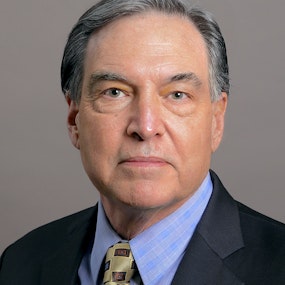
Jon Wellinghoff
CEO, GridPolicy
Jon Wellinghoff is CEO and Founder at Grid Policy, Inc. which enables the intersection of policy and distributed energy technologies, helping energy tech companies get to market and expand markets by addressing critical policy barriers to business success. He was formerly Chief Policy Officer at SolarCity and oversaw regulatory and legislative affairs on federal and state policy for the company. Jon was the longest serving Chairman of the Federal Energy Regulatory Commission (FERC/2009-2013), where he was known for his international expertise and thought leadership in energy policy, electric markets and the interface of disruptive energy systems with traditional utility structures. During this time, Jon worked to formulate new policies and rules to improve electric market efficiency and integrate new disruptive energy resources into wholesale energy markets.
Prior to joining SolarCity, Jon served as partner at the law firm Stoel Rives, where he provided knowledge and experience in energy law and the development of clean energy technology, consulting on energy policy with leaders in the U.S., China, Australia and Europe. While at Stoel Rives, Jon represented clients in emerging energy technology fields including energy storage, demand response, big energy data analytics and distributed generation.
Jon holds a Bachelor of Science degree in mathematics from University of Nevada, a Master of Science degree in teaching mathematics from Howard University and a Juris Doctor degree from Antioch School of Law.
New to Futurized podcast?
Here are some great episodes to start with. Or, check out episodes by topic.



































